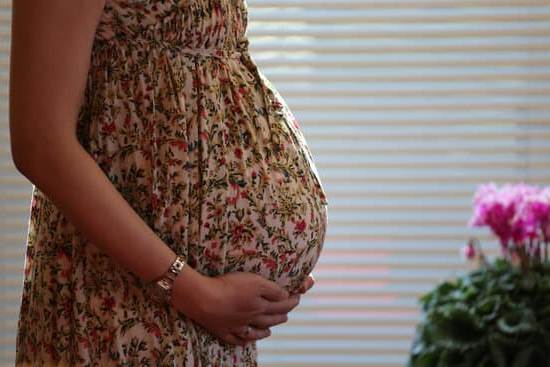Teenage pregnancy nutritional needs are crucial for the health and well-being of both the expectant mother and her developing baby. Proper nutrition plays a vital role in ensuring a healthy pregnancy, as well as supporting the growth and development of the unborn child. In this article, we will delve into the specific nutritional needs of teenage mothers and explore the importance of meeting these requirements for a successful and healthy pregnancy.
During adolescence, teenagers undergo rapid physical growth and development, which places additional demands on their bodies for essential nutrients. When coupled with the demands of pregnancy, it becomes even more critical to address the unique nutritional needs of teenage mothers. Understanding these specific requirements is essential in providing adequate support and care for young expectant mothers.
We will examine key nutrients such as vitamins, minerals, and essential nutrients that are particularly important during teenage pregnancy, as well as explore the impact of poor nutrition on both the mother and her developing baby. Additionally, practical tips for meeting these nutritional needs will be discussed, along with resources and support available for teenage mothers to access proper nutrition. This article aims to empower teenage mothers to prioritize their nutritional needs to ensure a healthy pregnancy and baby.
The Importance of Proper Nutrition During Teenage Pregnancy
Teenage pregnancy poses unique challenges, including the need for proper nutrition to support the health of both the mother and her developing baby. The importance of proper nutrition during teenage pregnancy cannot be overstated, as it directly impacts the health and well-being of both the mother and child. Teenage mothers have specific nutritional needs that differ from adult women, and understanding these needs is crucial for ensuring a healthy pregnancy and birth.
Specific Nutritional Needs of Teenage Mothers
Teenage mothers have higher nutritional requirements than their adult counterparts due to their own ongoing physical growth in addition to supporting the growth and development of their unborn child. Adequate intake of key nutrients such as folic acid, calcium, iron, and protein is essential for the overall health of teenage mothers and their babies. A deficiency in these vital nutrients can lead to serious health complications for both the mother and child.
The Impact of Poor Nutrition on Teenage Mothers and Their Babies
Poor nutrition during teenage pregnancy can have long-lasting effects on both the mother and her baby. Inadequate intake of essential nutrients can result in low birth weight, premature birth, or other complications during delivery.
Furthermore, teenage mothers who do not receive proper nutrition may also face an increased risk of developing gestational diabetes or pregnancy-induced hypertension, which can have detrimental effects on their own health. It is imperative that society recognizes the importance of providing adequate support and resources to ensure that teenage mothers are able to access proper nutrition throughout their pregnancies for optimal health outcomes.
Understanding the Specific Nutritional Needs of Teenage Mothers and Their Developing Babies
During pregnancy, a teenage mother’s body goes through significant changes to support the growth and development of her baby. As a result, there are specific nutritional needs that must be met to ensure both the health of the mother and the proper development of the baby. Understanding these unique nutritional needs is crucial for teenage mothers and their healthcare providers.
Increased Caloric Needs
Teenage mothers have increased caloric needs compared to their non-pregnant peers due to the demands of pregnancy. It is recommended that they consume an additional 300-500 calories per day during the second and third trimesters to support their growing baby. Adequate calorie intake is essential for maintaining a healthy weight gain during pregnancy and providing energy for fetal growth.
Protein and Iron Requirements
Protein is vital for fetal growth and maternal tissue expansion during pregnancy. Teenage mothers should ensure they are consuming enough protein from sources such as lean meat, poultry, fish, eggs, dairy products, legumes, nuts, and seeds. Similarly, iron plays a crucial role in preventing anemia in both the mother and baby. Iron requirements increase significantly during pregnancy to support the production of red blood cells and oxygen transport in the body.
Calcium and Vitamin D
Teenage mothers need adequate amounts of calcium for bone development in their growing baby. Sources of calcium include dairy products, leafy green vegetables, tofu, almonds, and fortified foods. Additionally, vitamin D is essential for calcium absorption and bone health. Teenage mothers should ensure they are getting enough sunlight exposure or consuming vitamin D-rich foods such as fortified milk and fatty fish.
Understanding these specific nutritional needs is essential for teenage mothers to prioritize their dietary intake during pregnancy. By incorporating a balanced diet rich in key nutrients, teenage mothers can support their own health as well as the optimal development of their babies. It is important for healthcare providers and support systems to educate teenage mothers about these nutritional needs and provide resources to help them meet those requirements effectively.
Key Nutrients for a Healthy Teenage Pregnancy
During teenage pregnancy, it is crucial for young mothers to ensure they are getting the proper nutrients to support their own health as well as the development of their babies. Here are some key nutrients that play a vital role in a healthy teenage pregnancy:
- Folic Acid: Folic acid is essential for the early development of the baby’s neural tube. It can be found in leafy green vegetables, citrus fruits, and fortified cereals.
- Calcium: Teenage mothers need adequate calcium for the development of the baby’s bones and teeth. Good sources of calcium include dairy products, tofu, and leafy green vegetables.
- Iron: Iron is important for preventing anemia in both the mother and baby. Red meat, poultry, fish, and beans are excellent sources of iron.
- Protein: Protein is crucial for the growth and development of the baby. Lean meats, eggs, dairy products, and legumes are rich in protein.
In addition to these key nutrients, teenage mothers should also ensure they are getting enough vitamins such as vitamin C and vitamin D, as well as minerals like zinc and magnesium. It is important for them to consult with a healthcare professional to determine their specific nutritional needs during pregnancy.
Poor nutrition during teenage pregnancy can have serious consequences for both the mother and her baby. Inadequate intake of essential nutrients can lead to low birth weight, preterm birth, or other complications. Therefore, it is important for teenage mothers to prioritize their nutritional needs and make healthy food choices for a successful pregnancy.
Ultimately, by focusing on obtaining these key nutrients through a balanced diet and prenatal supplements if recommended by a healthcare provider, teenage mothers can support their own well-being along with the healthy growth and development of their babies during pregnancy.
The Impact of Poor Nutrition on Teenage Mothers and Their Babies
Poor nutrition during teenage pregnancy can have serious consequences for both the mother and her developing baby. Without proper nourishment, the mother’s health may be compromised, and the baby may not receive essential nutrients for healthy growth and development. Here are some ways in which poor nutrition can impact teenage mothers and their babies:
1. Low birth weight: Inadequate intake of essential nutrients can result in low birth weight for the baby, increasing the risk of health complications both at birth and later in life.
2. Developmental issues: Without proper nutrition, the baby’s physical and cognitive development may be negatively affected, leading to long-term implications for their overall health and wellbeing.
3. Maternal health complications: Poor nutrition during pregnancy can increase the risk of maternal anemia, gestational diabetes, high blood pressure, and other health issues that can impact both the mother’s pregnancy experience and her long-term health.
It is crucial for teenage mothers to prioritize their nutritional needs to minimize these potential risks and support a healthy pregnancy and baby. By understanding the impact of poor nutrition, they can take proactive steps to ensure they are meeting their dietary requirements for themselves and their growing baby. With access to adequate resources and support, teenage mothers can navigate these challenges more effectively.
Practical Tips for Meeting the Nutritional Needs of Teenage Pregnancy
During pregnancy, it is crucial for teenage mothers to focus on their nutritional needs in order to support the healthy growth and development of both themselves and their babies. With the increased demands on their bodies, teenage mothers must ensure they are receiving the essential nutrients needed for a healthy pregnancy.
One practical tip for meeting these nutritional needs is to consume a well-balanced diet that includes a variety of fruits, vegetables, whole grains, lean proteins, and dairy products. This diversity ensures that both the mother and her developing baby receive all the necessary vitamins and minerals.
In addition to consuming a well-balanced diet, teenage mothers should also consider taking prenatal vitamins as recommended by their healthcare provider. Prenatal vitamins can help bridge any nutritional gaps and provide additional support for the health of both the mother and her baby. It is important for teenage mothers to consult with their healthcare provider to determine which prenatal vitamins are best suited for their individual needs.
Another practical tip for meeting the nutritional needs of teenage pregnancy is to stay hydrated by drinking plenty of water throughout the day. Proper hydration is essential for supporting overall health and can also help prevent issues such as constipation and dehydration.
Additionally, teenage mothers should aim to limit their intake of sugary beverages and opt for water as their primary source of hydration. By following these practical tips, teenage mothers can better meet their nutritional needs during pregnancy and support the healthy development of their babies.
Navigating Challenges and Barriers to Proper Nutrition During Teenage Pregnancy
Teenage pregnancy presents unique nutritional challenges and barriers that can impact the health and well-being of both the mother and her growing baby. One of the main challenges is access to affordable, nutritious food options for teenage mothers who may have limited financial resources.
This can result in a lack of essential nutrients needed for a healthy pregnancy, such as iron, folic acid, and calcium. Additionally, teenage mothers may face barriers such as lack of knowledge about proper nutrition during pregnancy, as well as inadequate support from healthcare providers or family members.
Another significant barrier to proper nutrition during teenage pregnancy is the prevalence of unhealthy eating habits and food choices among adolescents. Many teenage mothers may be accustomed to consuming fast food, sugary snacks, and processed meals, which can contribute to deficiencies in vital nutrients required for a healthy pregnancy. Furthermore, social factors such as peer influence and cultural norms can also impact the dietary choices of teenage mothers, leading to potential nutritional gaps.
It is crucial to address these challenges and barriers in order to support the nutritional needs of teenage mothers during pregnancy. Providing education on healthy eating habits tailored specifically to teenage pregnancy is essential, along with increasing access to affordable prenatal vitamins and mineral supplements. Additionally, creating a supportive environment where teenage mothers feel empowered to make positive nutritional choices through counseling and community programs can significantly impact their overall health and that of their babies.
| Barriers | Impact |
|---|---|
| Limited financial resources | Lack of essential nutrients for healthy pregnancy |
| Unhealthy eating habits | Potential nutritional deficiencies |
| Social factors (peer influence, cultural norms) | Impact on dietary choices |
Resources and Support for Teenage Mothers to Access Proper Nutrition
When it comes to the nutritional needs of teenage mothers, accessing proper resources and support is essential for the health of both the mother and her developing baby. Many teenage mothers may face challenges in obtaining the necessary nutrients due to factors such as limited financial resources, lack of knowledge about healthy eating, or inadequate support systems.
In order to address these barriers, it is important to highlight the resources and support available to help teenage mothers access the proper nutrition they need during pregnancy.
One key resource for teenage mothers is accessing government assistance programs designed to provide nutritional support for low-income individuals and families. Programs such as WIC (Women, Infants, and Children) offer food vouchers specifically for pregnant women and young mothers, ensuring they have access to essential foods that meet their nutritional needs. Additionally, healthcare providers can connect teenage mothers with community resources such as food banks, free meal programs, or educational workshops on healthy cooking and eating habits.
Support from family members and friends can also play a crucial role in helping teenage mothers access proper nutrition during pregnancy. Encouraging a supportive environment where loved ones can assist with meal preparation, grocery shopping, or childcare can alleviate some of the stress associated with meeting nutritional needs while balancing the demands of pregnancy and parenthood.
Furthermore, educational programs aimed at promoting healthy eating habits and nutrition education among teenage mothers are valuable resources for ensuring they have the knowledge and skills to make informed decisions about their dietary choices during pregnancy. These programs can provide guidance on meal planning, budget-friendly recipes, understanding food labels, and choosing nutrient-rich foods that support the health of both the mother and her baby.
| Resource | Description |
|---|---|
| Government Assistance Programs (WIC) | Offers food vouchers for pregnant women and young mothers |
| Community Resources | Food banks, free meal programs, educational workshops on healthy cooking |
| Support from Family & Friends | Assistance with meal preparation, grocery shopping, childcare |
| Educational Programs | Promoting healthy eating habits & nutrition education among teenage mothers |
Conclusion
In conclusion, it is clear that proper nutrition during teenage pregnancy is essential for the health and well-being of both the mother and her developing baby. The specific nutritional needs of teenage mothers require attention and focus in order to ensure a healthy pregnancy and birth.
Key nutrients such as vitamins, minerals, and essential nutrients play a crucial role in supporting the growth and development of the baby, as well as maintaining the overall health of the mother. It is important for teenage mothers to prioritize their nutritional needs and seek out support and resources to help them achieve optimal health during pregnancy.
Teenage pregnancy nutritional needs can be met through a balanced diet that includes a variety of fruits, vegetables, whole grains, lean proteins, and dairy products. Additionally, taking prenatal vitamins as recommended by healthcare providers can help fill any nutritional gaps and support the healthy growth of the baby.
It is also important for teenage mothers to stay hydrated and avoid unhealthy habits such as smoking, drinking alcohol, or using drugs, which can have negative effects on both their own health and the health of their babies.
Despite challenges and barriers that teenage mothers may face in accessing proper nutrition, it is crucial for them to seek out resources and support to meet their nutritional needs. This may include reaching out to healthcare providers for guidance, accessing community resources such as food assistance programs or support groups, or seeking education on healthy eating during pregnancy.
By empowering teenage mothers to prioritize their nutritional needs, we can contribute to better outcomes for both mother and baby during this critical period of development.
Frequently Asked Questions
What Nutrition Do You Need in Early Pregnancy?
In early pregnancy, it is important to focus on getting adequate amounts of folate, also known as folic acid. This nutrient helps in the prevention of neural tube defects in the growing fetus. Additionally, iron is crucial for the increased blood volume needed during pregnancy, and calcium is essential for the development of the baby’s bones and teeth.
What Are the Nutritional Needs of the Pregnant Patient?
Pregnant patients have an increased need for various nutrients including folic acid, iron, calcium, vitamin D, and omega-3 fatty acids.
Folic acid helps prevent birth defects, iron supports the production of red blood cells to carry oxygen to the baby, calcium is essential for bone development, vitamin D aids in calcium absorption, and omega-3 fatty acids are important for brain and eye development.
What Are the Food and Nutrition Guidelines for Pregnancy?
Food and nutrition guidelines for pregnancy typically include consuming a well-balanced diet that includes plenty of fruits and vegetables, whole grains, lean proteins, and healthy fats. It is also important to stay hydrated by drinking plenty of water throughout the day.
Additionally, pregnant individuals should aim to limit their intake of caffeine and avoid alcohol entirely during pregnancy. Regular physical activity is also recommended as part of a healthy lifestyle during pregnancy.

Welcome to my fertility blog. This is a space where I will be sharing my experiences as I navigate through the world of fertility treatments, as well as provide information and resources about fertility and pregnancy.





